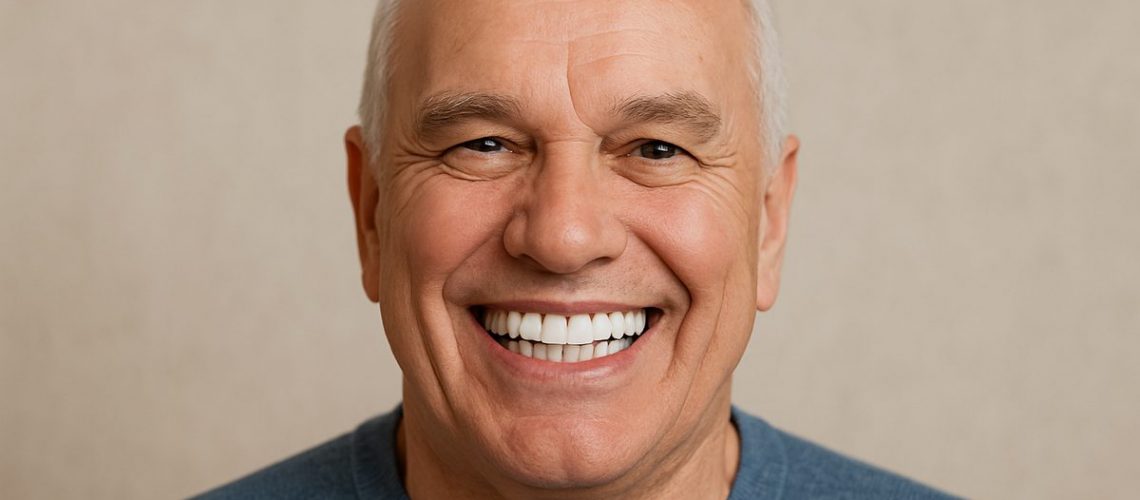Full mouth dental implants in Churchhill, PA refers to replacing an entire upper or lower set of teeth with implant-supported prostheses. This guide is for people with many missing or failing teeth who want a permanent, stable solution. You’ll learn the main options, who is a candidate, expected timeline, risks, costs, and how to start a consultation and treatment near Churchill, PA.
What Are Full Mouth Dental Implants?
A full-arch or full-mouth dental implant restoration replaces a whole row of teeth rather than one tooth at a time. Unlike single implants, full-arch solutions are designed to restore function, speech, and appearance for people who need most or all teeth replaced. Common approaches include fixed full-arch prostheses (like All-on-4), implant-supported dentures, and more complex reconstructions.
Benefits over traditional dentures include much better chewing ability, improved stability, fewer sore spots, and a more natural look. Full-arch plans are customized to the patient’s anatomy and goals.
Who Is a Candidate for full mouth dental implants in Churchhill, PA
Oral health factors
Candidates need healthy gums or gum disease that can be treated, and enough bone to support implants or the willingness to have bone grafting. Active infections, untreated dental disease, or severe gum disease must be addressed before implants. Some patients need extractions and grafts before implant placement.
Medical and lifestyle factors
General health matters. Conditions like uncontrolled diabetes, certain medications, or heavy smoking can raise implant risks. Age alone is not a barrier. Your goals, ability to follow care instructions, and willingness to attend follow-ups are also important to success.
Common Treatment Options and Technologies
All-on-4 and All-on-6 full-arch solutions
All-on-4 and All-on-6 use four or six implants to support a full fixed prosthesis. Fewer implants can often avoid grafting and shorten treatment. These are often used when patients want a non-removable, strong set of teeth.
Implant-supported dentures
Implant-supported dentures may be removable or fixed. Removable options snap onto implants and are easier to clean; fixed options feel more like natural teeth. The trade-offs are cost, maintenance, and how “natural” the prosthesis feels.
Zygomatic implants and complex reconstructions
For severe upper jaw bone loss, zygomatic implants anchor into cheekbone (zygoma) bone. These complex procedures are done by specialists when regular implants aren’t possible without major grafting.
CT-guided digital planning and surgical guides
CT scans and digital planning allow precise implant placement and create surgical guides. This makes surgery safer, faster, and more predictable, and helps avoid critical nerves and sinuses.
Anesthesia and sedation options
Options include local anesthesia, IV sedation, and full general anesthesia depending on the case and patient comfort. Discuss choices with your surgeon to match your medical needs and anxiety level.
Typical Procedure Timeline: From Consultation to Recovery
Consultation and planning
Your first visit includes an exam, CT scan, and discussion of options. Expect a personalized treatment plan and cost estimate. The team will review your medical history and explain whether grafts or extractions are needed.
Surgery day and immediate postop
On surgery day implants are placed and, when possible, a temporary prosthesis is attached. Expect swelling and some discomfort for several days. Pain is usually managed with medication, ice, and rest.
Recovery and long-term care
Initial healing takes weeks; bone integration takes months. Diet progresses from liquids to soft foods, then regular diet as your team advises. Final prosthesis is delivered once implants are stable. Regular cleaning and dental check-ups keep implants healthy.
Risks, Complications, and How They’re Minimized
Common risks include infection, implant failure, and temporary nerve irritation. Serious complications are rare with proper planning. Red flags are increasing pain, pus, numbness that doesn’t improve, or loose implants.
- How risks are lowered: CT-guided planning, experienced surgical teams, sterile technique, and careful medical review.
- Follow post-op instructions closely and report concerning signs early.
Cost, Financing, and Insurance Considerations
Cost depends on number of implants, grafting needs, lab fees, anesthesia, and whether zygomatic or other complex implants are required. Expect a wide range; your consult will give a tailored estimate. Many practices offer financing, third-party lending, and payment plans. Insurance sometimes covers extractions or parts of the restoration but often not the full cost of implants—check your plan ahead of time.
Questions to Ask Your Surgeon
- How many full-arch cases like mine have you performed?
- Who will place the implants and who will provide anesthesia?
- Do you use CT-guided planning and surgical guides?
- What anesthesia or sedation do you recommend?
- What are my realistic success rates and possible complications?
- What is the estimated timeline and total cost?
Why New Smile Now Is a Good Choice for Full Mouth Work
New Smile Now emphasizes safety, CT-guided planning, and full-arch solutions like All-on-4 with IV sedation and a multi-clinician team. Their approach focuses on minimizing invasiveness and managing complex cases with advanced technology and coordinated care.
Expert surgeons you should know
Full-arch implant care is led by Dr. Edward Halusic, who oversees implant planning and surgery. For wisdom teeth or other oral surgery needs tied to your treatment plan, Dr. Ryan McCloy is the referenced expert. The broader team includes Dr. Christian Moore and Dr. Troy Eans for comprehensive surgical support.
How to Get Started Near Churchill, PA
To begin, schedule a consultation with New Smile Now for an evaluation near Churchill, PA. Bring a list of medications, prior dental records, and any recent X-rays if available. Expect a CT scan, a review of options, and a clear plan with cost estimates. If you’re considering full mouth dental implants in Churchhill, PA, call New Smile Now to arrange an appointment and get personalized answers for your case.

